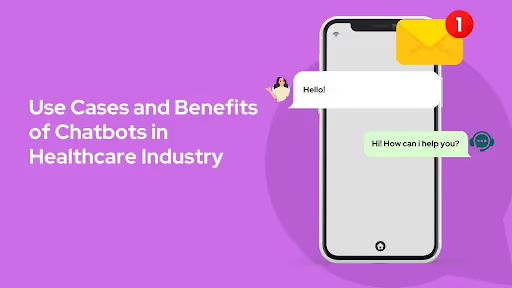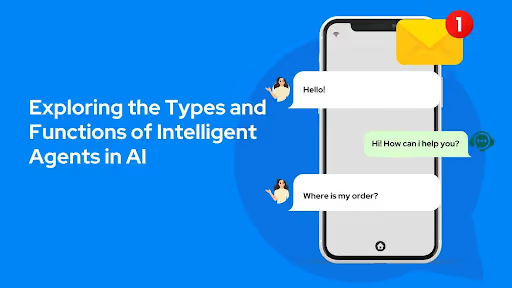Use Cases and Benefits of Chatbots in Healthcare Industry

The healthcare industry has seen a surge in digital transformation, and AI-driven chatbots are at the forefront of this shift. The market for healthcare chatbots is expected to grow from its estimated USD 1.49 billion in 2025 to around USD 10.26 billion by 2034.
Hospitals and clinics often struggle with high call volumes, delayed responses, and administrative bottlenecks. AI-powered chatbots bridge these gaps by providing instant responses, symptom assessments, appointment scheduling, and emergency support while reducing operational costs.
From streamlining patient engagement to improving data management, chatbots reshape how healthcare professionals interact with patients. In this article, let's explore their key applications and benefits.
Enhancing Patient Engagement with Healthcare Chatbots

Patient engagement is a critical factor in ensuring better healthcare outcomes. Chatbots make communication easier and more accessible by informing patients, reminding them to take their medications, and offering round-the-clock assistance.

Healthcare has the second-highest acceptance of chatbots by consumers at 27%.
Source: adamconell.me
- Providing a Continuous Flow of Information
Many patients find it difficult to receive prompt responses to their inquiries about their health. Chatbots bridge this gap by providing precise, up-to-date information about prescription drugs, therapies, and preventative care. Based on a patient's medical history, they can also offer tailored health advice.
Example: A chatbot integrated into a hospital's WhatsApp channel can remind diabetic patients to monitor their blood sugar levels and follow their prescribed diet.
- Handling Increased Call Volumes Post-Pandemic
After the pandemic, hospitals faced an unprecedented surge in patient queries. Call centers became overwhelmed, leading to long wait times. Chatbots reduce reliance on human agents by effectively triaging these queries.
Pro Tip: AI-powered WhatsApp chatbots like LimeChat's Marketing Suite can proactively engage with patients, addressing common questions before they escalate into hospital visits.
Now, let's explore how chatbots assist in symptom assessment and triage, helping patients get the proper care at the right time.
Symptom Assessment and Triage
Overcrowded emergency rooms and unnecessary doctor visits strain healthcare resources. Chatbots assist by evaluating symptoms, directing patients to the right level of care, and guaranteeing improved appointment readiness. This reduces wait times and improves overall efficiency.
- Reducing Non-Urgent Hospital Visits: By examining patient responses, chatbots can assess if a problem requires routine consultations, urgent medical attention, or basic at-home care. This eliminates needless hospital stays while prioritizing essential situations.
- Preparing Medical Records for Efficient Consultations: Chatbots streamline the consultation process by gathering patient history, symptoms, and pertinent medical information before a visit. This lets physicians review important details beforehand, guaranteeing a more focused and efficient consultation.
Pro Tip: By removing redundant questions during visits, pre-appointment chatbots can save consultation times by as much as 40%.
The next stage is to make sure patients can conveniently schedule and manage their appointments after symptom evaluation and triage have been streamlined. Let's examine how chatbots enhance the general patient experience, improve scheduling, and reduce administrative burdens.
Automating Appointment Scheduling and Management

Manual appointment scheduling frequently results in mistakes, protracted wait times, and irritated patients. By automating reservations, confirmations, and reminders, AI chatbots simplify the scheduling process and guarantee a hassle-free experience for patients and medical professionals.
- Enabling Seamless Booking and Modifications
Chatbots allow patients to book, reschedule, or cancel appointments without human assistance. They guarantee real-time availability updates by linking with hospital calendars, which minimizes scheduling conflicts and missed appointments.
For Example: Man Matters, a men's wellness brand, utilized LimeChat's AI-driven chatbot to automate 70% of customer queries, reducing agent overhead by 60% and cutting the average response time from 20 minutes to 3 seconds. This same efficiency level can be applied in healthcare, where timely scheduling is crucial.
- Reducing Staff Workload with Automated Scheduling
Managing appointment requests can take hours for healthcare workers, resulting in inefficiencies and exhaustion. AI chatbots manage patient inquiries, automate confirmations, and give pre-appointment instructions, freeing healthcare professionals to focus on important duties while enhancing the patient experience.
Pro Tip: LimeChat's WhatsApp Commerce Bot enhances patient interactions by bringing them directly to WhatsApp for easy appointment booking, reminders, and follow-ups.
Now that scheduling has been streamlined, let's examine how chatbots enhance the collection and documentation of patient data.
Data Collection and Maintenance of Patient Records
Accurate patient data is essential for personalized treatment, seamless care coordination, and efficient healthcare operations. AI chatbots streamline this process by automating data collection, minimizing human error, and guaranteeing secure record-keeping. This improves clinical decision-making as well as the patient experience.
- Secure Collection of Patient Information: Chatbots effectively collect and retain patient data safely and structured, including basic demographics and medical history. This ensures that healthcare providers have access to real-time data, lowers administrative burden, and eliminates the need for paperwork.
- Facilitating Video Consultations: Chatbots improve telehealth services by helping patients with digital intake forms, video call settings, and doctor connections. This increases patient happiness by making virtual consultations more accessible.
- Automating Post-Consultation Follow-Ups: Chatbots can remind patients to take their medications, track their progress toward recovery, and provide prescriptions after an appointment. This enhances treatment adherence and lowers the possibility of missing follow-ups.
- Enhancing Data Accuracy Through AI-Powered Insights: AI chatbots can identify symptom patterns, recommend preventive therapy, and identify possible health hazards by examining patient interactions. This enables medical professionals to provide more proactive and informed treatment regimens.
Pro Tip: A chatbot integrating with EHR (Electronic Health Records) ensures doctors receive pre-filled reports, cutting consultation time and improving diagnostic efficiency.
With data securely managed, explore how chatbots improve emergency response and administrative effectiveness in the healthcare industry.
Streamlining Administrative Tasks and Emergency Response

Administrative bottlenecks and delayed responses can negatively impact patient care, hospital efficiency, and healthcare accessibility. AI chatbots help by automating repetitive tasks, helping in urgent circumstances, and relieving support workers of some of their workload. This guarantees more effective healthcare operations, quicker resolutions, and better patient experiences.
- Handling FAQs and Healthcare Administration: Patients frequently inquire about hospital locations, insurance policies, appointment availability, or lab results. Chatbots automate responses to these common queries, allowing healthcare staff to focus on urgent tasks.
- Guiding Patients in Emergency Situations: AI chatbots can provide immediate first-aid instructions, help locate the nearest healthcare facility, and connect patients with emergency responders. This instant access to vital information has the potential to save lives.
- Automating Insurance Verification and Claims Assistance: Patients frequently find the process of processing insurance claims and confirming coverage to be time-consuming and frustrating. Chatbots can speed up and increase transparency by instantaneously verifying eligibility, updating claim status, and assisting patients with submission.
- Assisting Healthcare Staff with Workflow Optimization: In addition to patient interactions, chatbots can help healthcare providers by automating internal processes, including managing patient queues, assigning cases to doctors, and notifying staff of urgent situations. This increases productivity and guarantees that medical personnel can focus on providing high-quality care.
Now that emergency and administrative duties have been effectively completed, let's look into the broader advantages of AI-powered chatbots in the medical field.
Key Benefits of Healthcare Chatbots
AI-driven chatbots revolutionize how healthcare providers interact with patients, manage workflows, and enhance service delivery. These chatbots guarantee cost-effectiveness, accessibility, and efficiency by reducing wait times and improving emergency response. Here's how they make a real impact in modern healthcare.
- 24/7 Patient Assistance
Did you know that 52% of US patients use chatbots to obtain medical records? Chatbots offer 24/7 assistance, enabling patients to get medical information, make appointments, and get medicine reminders whenever needed. This constant accessibility guarantees prompt medical care and improves patient satisfaction.
- Critical Information During Emergencies
Chatbots can promptly provide vital medical information in emergencies, such as first aid guidelines or the location of the closest hospital. In times of crisis, this instant access to information can save lives and speed up reaction times.
- Scalability for High Patient Volumes
Patient volumes at healthcare facilities sometimes fluctuate, particularly during medical emergencies. Because chatbots can handle hundreds of interactions simultaneously, all patient questions will be promptly answered without overburdening the medical team.
- Enhancing Patient Satisfaction and Engagement
By providing quick, accurate, and personalized responses, chatbots improve the overall patient experience. Higher satisfaction percentages result from their ability to interact with patients, provide individualized health recommendations, and communicate consistently.
Integrating AI chatbots in healthcare is a technological advancement and a strategic move to enhance patient care and operational efficiency. Notably, a survey revealed that 67% of patients with sensitive health issues prefer scheduling appointments through online chatbots rather than human staff, highlighting the importance of privacy and comfort in patient interactions.
While the benefits are substantial, it's essential to consider the challenges and limitations associated with implementing healthcare chatbots. Let's explore these aspects to ensure a balanced understanding.
Challenges and Limitations of Healthcare Chatbots
While AI-powered chatbots bring efficiency and convenience, their implementation in healthcare comes with challenges. For chatbots to successfully and morally serve all patients, user experience problems, data protection difficulties, and accessibility restrictions must be resolved.
- User Experience Issues: Not all patients are comfortable interacting with AI. Particularly in situations that call for complex understanding and human empathy, poorly designed chatbots can result in misunderstandings, inaccurate responses, and dissatisfaction.
- Ethical and Privacy Concerns: Because healthcare chatbots handle private patient information, adherence to HIPAA, GDPR, and other legal requirements is crucial. Any data breach or improper handling could damage patient confidence and have legal consequences.
- Overcoming Accessibility Barriers: Standard chatbots could be difficult for elderly patients, people with disabilities, or people with low digital literacy levels. AI healthcare systems can be more inclusive through voice-activated chatbots, multilingual support, and simplified user interfaces.
Can These Challenges Be Addressed? Absolutely. AI chatbots, like LimeChat's Support Suite, utilize advanced NLP (Natural Language Processing), robust security measures, and an intuitive user interface to overcome these hurdles. They facilitate healthcare professionals' more efficient use of chatbots by guaranteeing compliance, accessibility, and precise responses.
Now, let's wrap up with key takeaways.
Conclusion
Healthcare chatbots are transforming patient interactions by enhancing engagement, automating scheduling, streamlining data management, and assisting in emergencies. Even though they have many advantages, such as round-the-clock assistance, scalability, and increased patient satisfaction, issues like accessibility, data security, and user experience must be addressed for successful deployment.
LimeChat's Support Suite provides intelligent automation, privacy law compliance, and a smooth user experience for healthcare facilities looking to incorporate a safe, AI-powered chatbot solution. Explore LimeChat's AI-powered chatbots to improve efficiency and patient care today!
Transform your marketing and support today




.avif)
